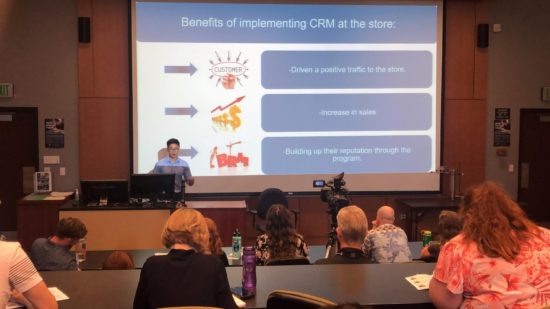
Story and a photo by Saki Kambe

The Honors cohort of 2019, Mckenna Bell Duffy, Curtis Welcker, Hannah Corey, An Võ and Matthew Garner presented their Capstone Projects on June 13.
Honors Program is “a unique educational program for highly motivated students who seek to be engaged in an intensive learning process where they make connections among ideas while developing critical thinking skills as they pursue their individually chosen degree,” according to Bruce Hattendorf, lead of the Honors Program.
During the first year of study, Honors students are introduced to valuable ideas of civilization in a series of seminars taught by scholars at the college. They deepen their understanding through flipped-classroom inspired, discussion-based classes.
According to Hattendorf, students learn self-assessment, the process of carefully and critically examining their understanding of ideas and their contribution to the seminar learning experience.
Students simultaneously learn how to integrate knowledge from all their courses and extracurricular experiences and to share their insights with others in their Honors cohort.
Through this process, they discover what to do for their honors project. This is why Capstone Project is considered as a culmination of Honors Project.
Students work with a faculty mentor on a project the faculty member is conducting, or develop a project that is uniquely their own with a mentor they would like to work with.
In the second year of study, students continue the process of self-assessment and interdisciplinary research while working on their projects. Students share developments in their work with their classmates.
In the end, in the spring quarter, students complete all phases of their research projects, including this presentation at the Honors Symposium. This is why the Capstone Project is considered as an optimal culmination of the Honors Program.
Mathematics inspired Mckenna Bell Duffy’s Capstone Project, but it was not limited to mathematics. As the Honors Program holds ‘interdisciplinary’ as one of their strengths, she proved how mathematics plays a significant role in meeting social justice, in this case, in collaboration with English. In response to a question thrown from the audience, Duffy made clear that she would like to fight for Native students’ education rights.
Curtis Welcker is both an Honors student and an intern at the Coastal Watershed Institute CWI. He documented marine ecosystem restoration of the Eastern nearshore of the Elwha River mouth and Beach Lake Site. He also presented an overview of his internship at an Elwha nearshore community meeting.
Hannah Corey’s Capstone Project was creative a historical fiction treatment of Hitler. She created a draft for her future book, in regards to Hitler. She did storytelling on the chapter she wrote, with some help from Tim Williams, Instructional and Reference Librarian. She hopes to continue her writing for the future book, after graduation.
Graduating with an Associates of Arts Degree with a focus in business, An Võ conducted surveys within local
businesses and their partnerships with the non-profits, using Cause Related Marketing as a Capstone Project. He said, in the near future, he would like to take this research “dive into the benefits of connecting suppliers, distributors, consumers, and charities to
stimulate the local economy.”
Matthew Garner, a chemistry major student, built a prototype high-pressure vessel apparatus for fluid extraction. He caught the attention of the audience by actually bringing the equipment to the Symposium and showing the clip of the equipment extracting with supercritical Carbon Dioxide. He said he is excited to further educate himself in chemistry at Portland University.
Faculty said they were impressed with how far the students investigated their research within a two-year program.
